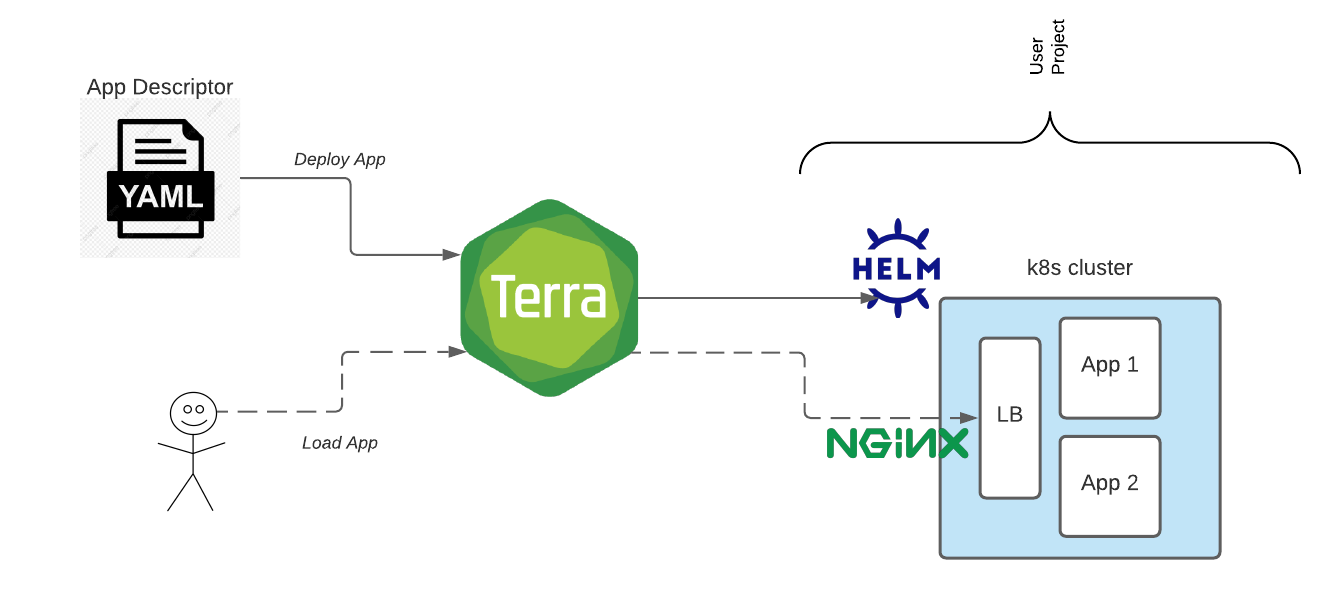This repo contains tooling for launching custom approved apps in Terra.
Note this project is under active development, and may not be fully functional yet.
- Architecture
- App Schema
- Supported Apps
- Launching an App Locally
- Launching an App on Terra
- Helm Chart
- Publishing
terra-app-chartsHelm Chart
Apps are defined by a YAML schema. An "app launcher" (such as Terra) receives a request to launch an app, parses the app YAML file, and invokes the helm chart with the appropriate values to launch the app on a Kubernetes cluster. Once the app is launched, it may be accessed by the end user in a browser via a proxy URL defined by the app launcher.
Diagram of the app launch flow:
Note: the schema is under evolution!
Here is a description of the app YAML schema:
# Short name of the app, for example 'jupyter'. This is used to name some Kubernetes resources,
# for example the namespace is generated as 'jupyter-ns'.
name: jupyter
# Maintainer of the app. Informational only.
author: workbench-interactive-analysis@broadinstitute.org
# Longer description of the app. Informational only.
description: |
Jupyter Notebook, Python and R kernels, GATK packages
# Version of the app. Informational only.
version: 1.0.14
# List of services the app exposes.
# NOTE: currently only one service is supported by the helm chart. In the future we may explore multi-service apps.
services:
jupyter:
# The app docker image. Required.
image: "us.gcr.io/broad-dsp-gcr-public/terra-jupyter-gatk:1.0.14"
# Port the app listens on. Required.
port: 8000
# Optional. If the app is configured to listen on a base URL path, specify it here.
# If absent, we assume the app listens on / and we will set up an nginx reverse proxy based on
# the service name. However, not all apps are guaranteed to behave correctly under reverse proxies;
# so if possible, configure your app with a base URL.
baseUrl: "/jupyter/"
# Optional. Specifies a startup command and arguments for the app. This overrides the Dockerfile
# ENTRYPOINT if present.
command: ["/usr/local/bin/jupyter"]
args: ["notebook"]
# Optional. Specifies the mount point for an attached PD and the access mode (ReadWriteOnce or ReadOnlyMany
# for read-write or read-only disks respectively). If absent no persistent volumes will be created.
pdMountPath: "/data"
pdAccessMode: "ReadWriteOnce"
# Optional. Specifies environment variables to be present in the container.
environment:
WORKSPACE_NAME: "my-ws"
WORKSPACE_NAMESPACE: "my-proj"
Example apps can be found in this repo under apps. View the following for more details:
If an app is in this list, it should have a working smoke test run on PRs. See the testing section for details
This repo contains a terra-app-local.sh script which can launch apps on a locally running minikube cluster. This can be much more convenient for development than launching apps against Terra.
Before running the script:
- Install
minikubeaccording to instructions here. - Start
minikubeservice. a. On Mac (Catalina) I start it with the command (when NOT connected to a VPN):Replace the data directory with the directory you want to mount into your persistent volume (or omit if not using persistence).minikube start --vm=true --mount --mount-string="~/data:/data"
Once minikube is running, you can run the script. Here is the usage:
$ ./terra-app-local.sh
terra-app-local.sh deploys an app on a local minikube cluster.
Find more information at: https://github.com/DataBiosphere/terra-app
Usage:
terra-app-local.sh [command]
Available commands:
install installs an app
uninstall deletes an app
status displays stats about an app
list lists all apps
show-kubectl prints kubectl commands to interact with an app
Flags:
-h, --help display help
Use "terra-app-local.sh [command] --help" for more information about a command.
Example:
$ ./terra-app-local.sh install -f /apps/jupyter/app.yaml
The script detailed in the local launching section, terra-app-local.sh, is also used to smoke-test supported apps on merges to this repo. If you are adding an app, and want it to be automatically tested, be sure to add it to the app matrix in the github action file.
These smoke-tests DO NOT test against Terra/Leonardo. It may be desirable to have a dedicated test in leonardo pegged to a specific version of an app.yaml. This is not possible until we begin publishing and versioning these app yaml. See https://broadworkbench.atlassian.net/browse/IA-2495.
Leonardo has an endpoint that takes an app descriptor and various arguments. See the swagger documentation for the endpoint, and the associated CreateAppRequest schema (located near bottom of swagger specification).
There are two helm charts inside this repo:
- terra-app-setup-chart: this chart sets up common infrastructure used by Galaxy and Terra custom apps.
- terra-app-chart: this chart deploys Terra custom apps.
The charts are deployed to the following repos:
helm repo add terra-app https://terra-app-charts.storage.googleapis.com
helm repo add terra-app-setup https://terra-app-setup-chart.storage.googleapis.com
helm repo update
$ helm show chart terra-app/terra-app
apiVersion: v2
description: Chart for deploying Terra applications
name: terra-app
type: application
version: 0.3.0
$ helm show chart terra-app-setup/terra-app-setup
apiVersion: v2
description: Chart for set up entities for deploying Terra applications
name: terra-app-setup
type: application
version: 0.0.1
